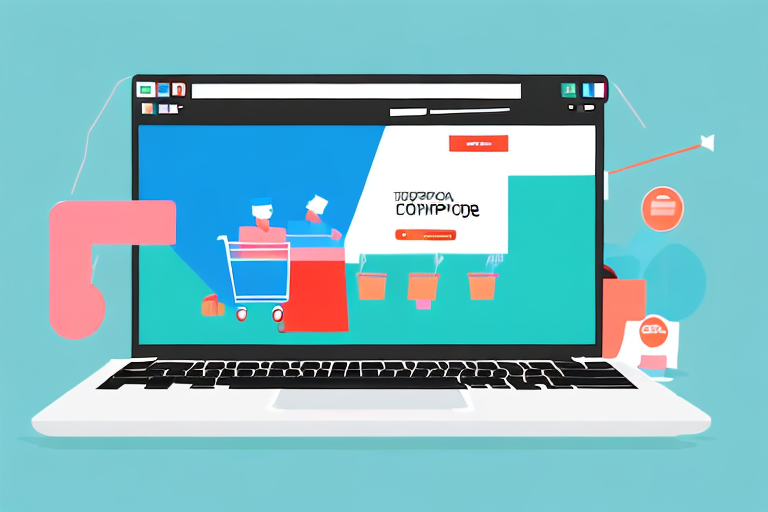Ecommerce
The Indonesian Online Consumer Behavior
Indonesia’s economy is rapidly growing, and as a result, the country’s eCommerce sector is expanding at an impressive rate. With increasing access to the internet, mobile phones, and digital payment options, more Indonesians are turning to online shopping.
In this article, we will explore the trends and challenges of Indonesian online consumer behavior.

Contents
- An Overview of Indonesian Online Shopping Habits
- The Influence of Social Media on Indonesian Online Shopping
- Identifying Challenges to Indonesian Online Shopping
- The Impact of Payment Security on Indonesian Online Consumers
- Trends in Indonesian Online Consumer Behavior
- Examining the Role of Brand Loyalty in Indonesian Online Shopping
An Overview of Indonesian Online Shopping Habits
Indonesia is a country with a population of over 270 million people, making it the fourth most populous country in the world. With a growing middle class and increasing access to the internet, online shopping has become a popular trend in recent years.
Factor driving the growth of online shopping in Indonesia:
- Social media: Indonesians are avid social media users, with over 150 million active users on Facebook alone. This trend has affected their online shopping habits, with social media becoming a significant influence on the way Indonesians shop online. Users turn to platforms like Instagram and Facebook to browse, purchase, and review products. In fact, a recent survey found that 87% of Indonesian online shoppers use social media to discover new products and brands.
- Convenience: Convinience plays a massive role in why Indonesian consumers are choosing to shop online. With long working hours and traffic congestion in the country’s urban areas, online shopping provides a time-saving alternative to physical store visits. This is particularly true for those living in Jakarta, the capital city, where traffic congestion is a significant issue. Online shopping allows consumers to avoid the hassle of commuting and parking, and instead, shop from the comfort of their own homes.
- Increasing availability of e-commerce platforms: Companies like Tokopedia, Bukalapak, and Lazada have made it easier for small businesses to sell their products online, providing consumers with a wider range of products to choose from. These platforms also offer various payment options, including cash on delivery, making online shopping accessible to those without credit cards.
- Purchase products from overseas: With many international brands not available in Indonesia, online shopping allows consumers to access a wider range of products from around the world. This has led to the popularity of cross-border e-commerce, with many Indonesians purchasing products from countries like China, the United States, and Japan.
In conclusion, online shopping has become a popular trend in Indonesia, driven by factors such as social media, convenience, and the availability of e-commerce platforms. As technology continues to evolve and access to the internet expands, it is likely that online shopping will continue to grow in popularity in Indonesia.
The Influence of Social Media on Indonesian Online Shopping
In recent years, social media has revolutionized the way Indonesian consumers shop online. With the rise of social media platforms such as Instagram, Facebook, and Twitter, Indonesian consumers are now able to discover new products and receive recommendations from friends and influencers like never before. Social media has become the go-to platform for Indonesian consumers to find inspiration and make informed purchasing decisions.
One of the reasons why social media has become so popular among Indonesian consumers is because it provides a personalized shopping experience. Social media allows consumers to interact with brands and influencers directly, giving them the opportunity to ask questions, provide feedback, and receive personalized recommendations. This level of interaction has made shopping more engaging and enjoyable for Indonesian consumers.
However, the rise of social media has also led to a rise in fake social media accounts and fraudulent sellers, posing significant challenges to online shopping in Indonesia. These fake accounts and sellers often use social media to promote fake products or scam unsuspecting consumers. As a result, e-commerce platforms have had to step up their efforts to authenticate sellers and protect consumers.
They are few ways that e-commerce platforms used in addressing this issue:
- Implementing stricter verification processes for sellers: For example, many e-commerce platforms require sellers to provide government-issued identification, business registration documents, and other forms of verification before they can start selling on the platform. This helps ensure that only legitimate sellers are able to sell products on the platform.
- Investing in technology to detect and prevent fraudulent activity: E-commerce platforms have performaaing this to stricter verification processes. For example, some platforms use machine learning algorithms to analyze seller behavior and detect suspicious activity. This helps platforms identify fraudulent sellers and take action before they can scam consumers.
Despite the challenges posed by fake social media accounts and fraudulent sellers, social media remains a powerful tool for Indonesian consumers to discover new products and make informed purchasing decisions. As long as e-commerce platforms continue to invest in verification processes and technology to protect consumers, social media will continue to play a significant role in the future of online shopping in Indonesia.

Identifying Challenges to Indonesian Online Shopping
Here are the challenges of to Indonesian online shopping and strategies to solve:
| Challenges | Strategies |
|---|---|
|
|
Despite these challenges, the Indonesian eCommerce market is growing rapidly, with more and more consumers turning to online shopping for convenience and accessibility. By addressing these challenges and building consumer trust, eCommerce businesses in Indonesia have the potential to reach a vast and growing market of online shoppers.
The Impact of Payment Security on Indonesian Online Consumers
Security issues have significantly impacted Indonesian online consumer behavior, and payment methods play a significant role. As digital payments become increasingly popular, concerns over security breaches have led some consumers to stick to traditional payment methods like cash-on-delivery.
While cash-on-delivery may seem like a safer option, it comes with its own set of risks. Consumers must have cash on hand, which can be inconvenient, and there is always the possibility of theft or loss during the delivery process.
That’s why e-commerce companies are partnering with payment providers to offer secure digital transaction options like e-wallets and credit cards. These payment methods offer convenience and security, allowing consumers to make purchases without leaving their homes while keeping their financial information safe.
However, simply offering secure payment options is not enough. E-commerce companies must also invest in fraud detection technology to ensure consumer protection. This technology can detect and prevent fraudulent transactions, giving consumers peace of mind when shopping online.
Moreover, e-commerce companies must also educate consumers on the importance of safe online shopping practices. This includes using strong and unique passwords, avoiding public Wi-Fi when making purchases, and checking for secure website URLs.
By offering secure payment options, investing in fraud detection technology, and educating consumers on safe online shopping practices, e-commerce companies can help alleviate concerns over payment security and encourage more Indonesian consumers to embrace digital payments.

Trends in Indonesian Online Consumer Behavior
The COVID-19 pandemic has had a significant impact on the way Indonesians shop. With the implementation of social distancing measures, consumers have been forced to find new, contactless ways of purchasing goods and services. This has led to a surge in online shopping, with more and more Indonesians turning to eCommerce platforms to fulfill their needs.
These are the trends of Indonesian Online Behavoir:
- Rise of mobile commerce: As smartphone penetration in Indonesia continues to grow, consumers are increasingly using their mobile devices to shop online. This has created new opportunities for businesses to reach customers in innovative ways, such as through mobile apps and social media platforms.
- Proliferation of online marketplaces: Platforms such as Tokopedia and Lazada have made it easier than ever for small businesses and entrepreneurs to sell their products online, reaching a wider audience than ever before.
However, with this growth comes new challenges:
- As the eCommerce industry becomes increasingly crowded, businesses must find ways to differentiate themselves from the competition. This may involve investing in new technologies or developing innovative marketing strategies to stand out in a crowded marketplace.
- Furthermore, as Indonesia’s eCommerce industry continues to grow, it is likely to face increased scrutiny from regulators. As with any rapidly evolving industry, there are concerns about consumer protection and data privacy that must be addressed to ensure the long-term sustainability of the sector.
Despite these challenges, the outlook for Indonesia’s eCommerce industry remains positive. With a large and growing population of tech-savvy consumers, a supportive government, and a thriving startup ecosystem, the future looks bright for businesses looking to capitalize on the country’s eCommerce boom.

Examining the Role of Brand Loyalty in Indonesian Online Shopping
Indonesia is one of the fastest-growing eCommerce markets in the world, and brand loyalty plays a significant role in the online shopping behavior of Indonesian consumers. Brand loyalty is defined as the tendency of consumers to repeatedly purchase products or services from a specific brand due to their positive experiences with that brand.
Indonesians value brand loyalty, and this is reflected in their online shopping behavior, such as:
- Stick with brands they trust: This influences their purchasing decisions. This is especially true for products that are considered high-involvement, such as electronics, fashion, and beauty products. For these types of products, consumers are more likely to choose brands that they have had positive experiences with in the past.
- Prevalence of promotional discounts and free shipping incentives: Many eCommerce companies in Indonesia offer these types of promotions to encourage consumers to shop more frequently with their favorite brands. This strategy has been successful in increasing brand loyalty and driving repeat purchases.
Other trends that are shaping the Indonesian eCommerce market:
- Social media: Socia medis is becoming an increasingly important channel for eCommerce companies to reach consumers. Many companies are using social media platforms like Instagram and Facebook to showcase their products and engage with their customers.
- Mobile commerce: With more and more consumers using their smartphones to make purchases online. This trend is driven by the increasing availability of affordable smartphones and the growing popularity of mobile payment options.
- eCommerce expansion : Another trend that is shaping the Indonesian market. Many companies are expanding their eCommerce offerings to include a wider range of products and services. This includes everything from groceries and household items to travel and entertainment.
It is important for eCommerce companies to understand the role of brand loyalty in Indonesian online shopping behavior. To succeed in this market, companies must prioritize consumer trust and safety, build authentic relationships with their customers, and provide convenient and accessible shopping experiences. This includes offering a wide range of payment options, providing fast and reliable shipping, and investing in customer service.
In conclusion, Indonesian online consumer behavior is rapidly evolving, driven by trends in social media, mobile commerce, and eCommerce expansion. To succeed in this market, eCommerce companies must prioritize consumer trust and safety, build authentic relationships with their customers, and provide convenient and accessible shopping experiences.
